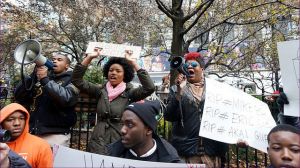
Protesters at a New York City demonstration in support of the people of Ferguson, Missouri, November 28, 2014. (Image: Flickr/ The All-Nite Images)
It doesn’t help that the mainstream cable news nets are poorly suited to handle such a difficult topic in a way that offers some illumination. Much of their coverage boils down to shouting at each other about whether race even plays a role in American society today — a debate about whether people of color are treated differently by the criminal justice system, or face economic challenges that their white counterparts don’t. But this is not a serious matter of debate — denying that race matters is akin to denying that human activity is warming the planet. It flies in the face of rigorous empirical research by sociologists, historians and economists.
Over the years, Bill Moyers has taken another approach, conducting interviews that grapple honestly with our history — and our present. Below, a collection of discussions about race in America.
In this 2007 segment from Bill Moyers Journal, theologian James H. Cone tells Bill that the modern criminal justice system serves a purpose similar to lynchings of the past: To maintain a system of white supremacy. Cone is a scholar at the Union Theological Seminary in New York, and is best known for his work advocating black liberation theology.
Watch the full interview with James H. Cone.
In this December, 2013 segment of Moyers & Company, University of Ohio law scholar Michelle Alexander, author of The New Jim Crow, looks at the same issue from a more recent perspective, telling Bill that the “war on drugs,” mandatory minimum sentences and the explosive growth of America’s carceral state were part of a larger backlash against the gains African Americans made in the middle of the last century.
Watch the full episode with Michelle Alexander.
In the segment below, historian Khalil Gibran Muhammad, Director of the Schomburg Center for Research in Black Culture in New York City, explains that “stop and frisk” is “an old and enduring form of surveillance and racial control,” the roots of which can be traced back to the “black codes” in the post-Civil War South. This segment first aired on Moyers & Company in the summer of 2012.
Watch the full episode interview with Khalil Gibran Muhammad.
Finally, Bill was joined by The Atlantic’s Ta-Nehisi Coates this summer to discuss his much-discussed cover story, “The Case for Reparations.” In the clip below, Coates tells Bill that living with the sins of our past is something that affects all Americans, including himself. “I think part of the problem is when we talk about this as a situation of ‘what do white people owe to black people?’ And that ain’t really it. It’s what the United States, first of all, owes African-Americans, but not far behind that, what it owes itself… We’re all part of this.”
Watch the full interview with Ta-Nehisi Coates.


